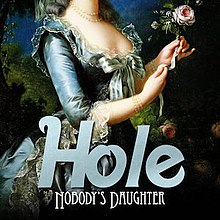Nobody's Daughter
| Nobody's Daughter | ||||
|---|---|---|---|---|
 |
||||
| Studio album by Hole | ||||
| Released | April 23, 2010 | |||
| Recorded | January 2009–2010 | |||
| Studio |
Various
|
|||
| Genre | Alternative rock | |||
| Length | 47:09 | |||
| Label | Mercury | |||
| Producer | ||||
| Hole chronology | ||||
|
||||
| Singles from Nobody's Daughter | ||||
|
||||
| Professional ratings | |
|---|---|
| Aggregate scores | |
| Source | Rating |
| Metacritic | 57/100 |
| Review scores | |
| Source | Rating |
| AllMusic | |
| The Daily Telegraph | |
| Entertainment Weekly | C+ |
| The Guardian | |
| MSN Music | A– |
| NME | 6/10 |
| Pitchfork | 2.9/10 |
| Rolling Stone | |
| Spin | 7/10 |
| The Times | |
Nobody's Daughter is the fourth and final studio album by American alternative rock band Hole, released worldwide on April 27, 2010, through Mercury Records. The album was originally conceived by Hole frontwoman Courtney Love as a solo project titled How Dirty Girls Get Clean, following her poorly received solo debut America's Sweetheart (2004). Much of the material featured on Nobody's Daughter originated from studio sessions for How Dirty Girls Get Clean, which had been conceived in 2006 after a multitude of legal issues, drug addiction, and rehabilitation sentences had left Love "suicidal". Love financed the making of the record herself, which cost nearly two million dollars.
In 2009, Love announced that the album would be released under the band name Hole, along with guitarist Micko Larkin, bassist Shawn Dailey and drummer Stu Fisher. It was the first Hole album to be released in twelve years, since 1998's Celebrity Skin, and also the group's first release to not feature Eric Erlandson. Upon its release, Nobody's Daughter received generally mixed reviews from music critics, though Courtney Love stated that she felt it was "the best record she'd ever made". In 2012, Love abandoned the Hole moniker and returned to writing and recording as a solo artist, making Nobody's Daughter the band's final release.
In September 2005, after violating a legal drug probation, Courtney Love was sentenced to a six-month program in a lock-down rehabilitation center, Beau Monde, from which she was released after one half of the sentenced time and completed the other three months under house arrest. During the period in rehab, producer Linda Perry visited Love and supported her by encouraging to write new songs, giving Love a Martin acoustic guitar. Love then borrowed a Panasonic compact-cassette recorder and penned eight songs during her time in rehab, among them "My Bedroom Walls", "The Depths of My Despair", "Sad But True" and "How Dirty Girls Get Clean." Love later told Billboard magazine that "my hand-eye coordination was so bad, I didn't even know [guitar] chords anymore. It was like my fingers were frozen. And I wasn't allowed to make noise [in rehab]." She also told of how she would "sit there and try to quietly write and struggle", as well as of her negative mindset. "I never thought I would work again. 'No one is ever going to talk to me. I'm never going to get a record deal. I'm never going to get on stage again.' So, I just kept writing. This is a very personal album."
...
Wikipedia
